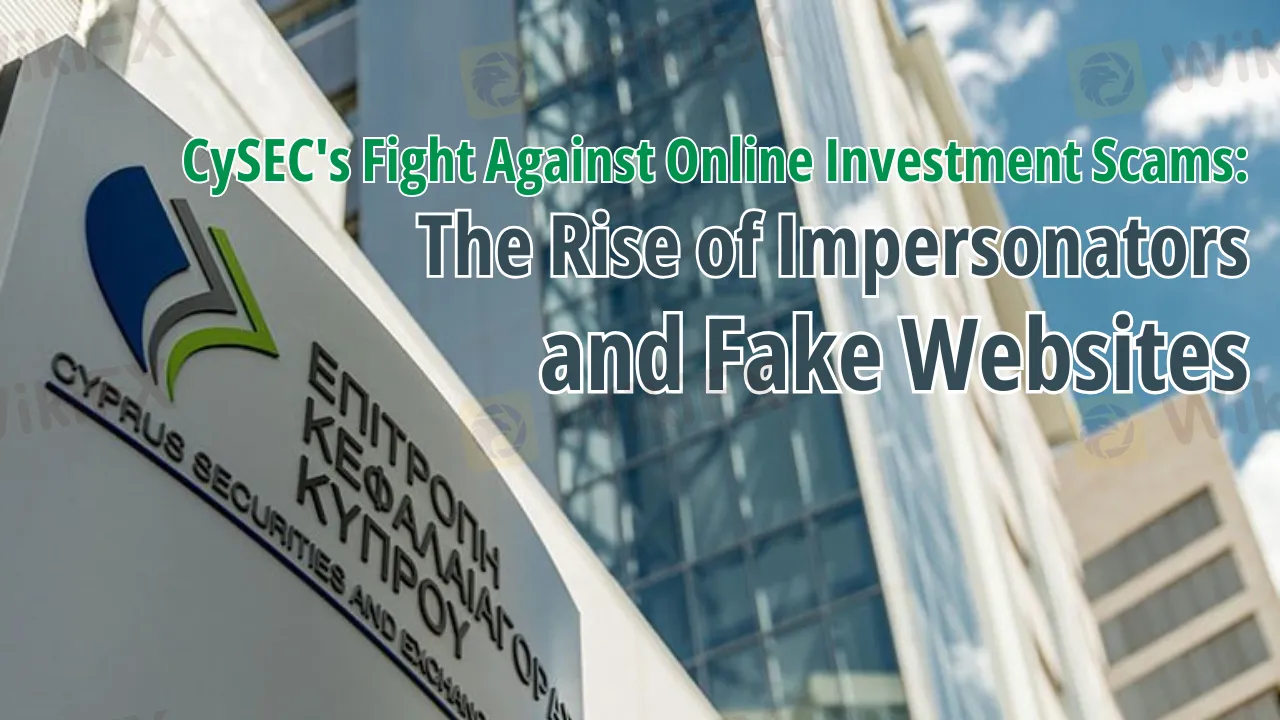简体中文
繁體中文
English
Pусский
日本語
ภาษาไทย
Tiếng Việt
Bahasa Indonesia
Español
हिन्दी
Filippiiniläinen
Français
Deutsch
Português
Türkçe
한국어
العربية
CySEC's Fight Against Online Investment Scams: The Rise of Impersonators and Fake Websites
Abstract:CySEC's battle against investment scams sees a surge in impersonators and fake websites. Explore the depth of these scams and the role of social media in this revelation.

The digital age has presented us with countless opportunities, but with it, comes an equal measure of threats. A key issue that has gained prominence in recent times is the rise of investment scams through impersonation and fake websites. At the forefront of battling this menace is the Cyprus Securities and Exchange Commission (CySEC).
Understanding the Scam: Impersonators & Fake Domains
CySEC, in its recent announcements, warns investors about fraudsters who masquerade as CySEC officers, misleadingly promising to settle compensation claims related to firms the regulator supervises. For a fee, of course.
Additionally, the impersonation doesn't end with individuals. CySEC has detected fake websites designed to mimic its official domain. These websites, with URLs such as cysec-regulatory.com and www.cysecgov.com, expertly mirror CySECs official imagery and content.
Decoding the Impersonation Menace

It's important to understand the depth of the deceit. For instance, another sham website, Cysecs.group, not only replicates CySEC but also provides counterfeit lists of approved investment firms in Cyprus. Such websites invariably have links connected to unauthorized or downright fraudulent brokers.
CySEC has clearly stated that it never solicits individuals via phone or sends unsolicited correspondence. Moreover, it doesnt have the authority to collect any fees from investors. The public, thus, must be wary of unsolicited communications from individuals or entities claiming association with CySEC.
The Role of Social Media in Amplifying the Threat
As we delve deeper into the issue, the role of social media platforms in proliferating scams becomes evident. Platforms such as Telegram are increasingly being used by scammers to pose as financial institutions, often promising attractive trading signals.
While CySEC doesnt directly combat financial service scams on social media, it employs advanced tools to monitor such fraudulent activities. On spotting a fake website or illicit activity, they promptly alert the concerned law enforcement agencies.
Interestingly, a recent survey by CySEC highlighted the increasing dependency on social media for financial advice. A whopping 31% of participants admitted to trusting financial influencers for investment decisions, and another 22% said they were influenced by celebrity endorsements and online promotions.
Stay Vigilant, Stay Safe
In conclusion, while regulators like CySEC are doing their part, the onus falls upon us, the investors, to remain vigilant. As the digital world grows more intricate, staying educated and cautious is our best defense against falling prey to such scams.
For continuous updates on such crucial information, consider installing the WikiFX App, available for download here: https://www.wikifx.com/en/download.html.

Disclaimer:
The views in this article only represent the author's personal views, and do not constitute investment advice on this platform. This platform does not guarantee the accuracy, completeness and timeliness of the information in the article, and will not be liable for any loss caused by the use of or reliance on the information in the article.
Related broker
Read more

CMC Markets: A Closer Look at Its Trading Environment
CMC Markets provides access to four trading platforms: MetaTrader 4 (MT4), MetaTrader 5 (MT5), TradingView, and its proprietary web platform. Each platform supports different tools, asset classes, and execution features.

He Lost RM275,000 to a Fraudulent "Moomoo" Scam
A 57-year-old engineer lost RM275000 in an online investment scam that misused the name of a well-known trading platform, Moomoo. The scam was promoted through a Facebook advertisement in April and led the victim to believe he was engaging in a credible investment opportunity.

The Hidden Dangers of Viral Trading Advice
Do you turn to social media for trading advice? If yes, do you know that much of what you are consuming could be doing more harm than good?

Forex Trading Lot Size: Decide it Right to Reap the Right Results
Determining the right forex trading lot size is pivotal to enjoying a long run in the forex market. Go through this guide to know how to do it.
WikiFX Broker
Latest News
Stablecoins go mainstream: Why banks and credit card firms are issuing their own crypto tokens
The Dollar Keeps Falling: How Should We View Exchange Rate Volatility?
Asia-Pacific markets rise as investors parse a slew of data releases
Asia-Pacific markets mostly rise as investors parse a slew of data releases
WikiFX Gala Night Malaysia Concludes Successfully
IG Group Unlocks Over £425 Million amid a Capital Reduction
Gold Prices Fall by INR 39,300 in the Last Week? What's Next Week's Outlook?
European stocks open slightly higher as UK-U.S. trade deal cuts autos, aviation tariffs
Treasury yields tick lower as Trump's spending bill in focus
European stocks mixed as UK-U.S. trade deal cuts autos, aviation tariffs
Currency Calculator


